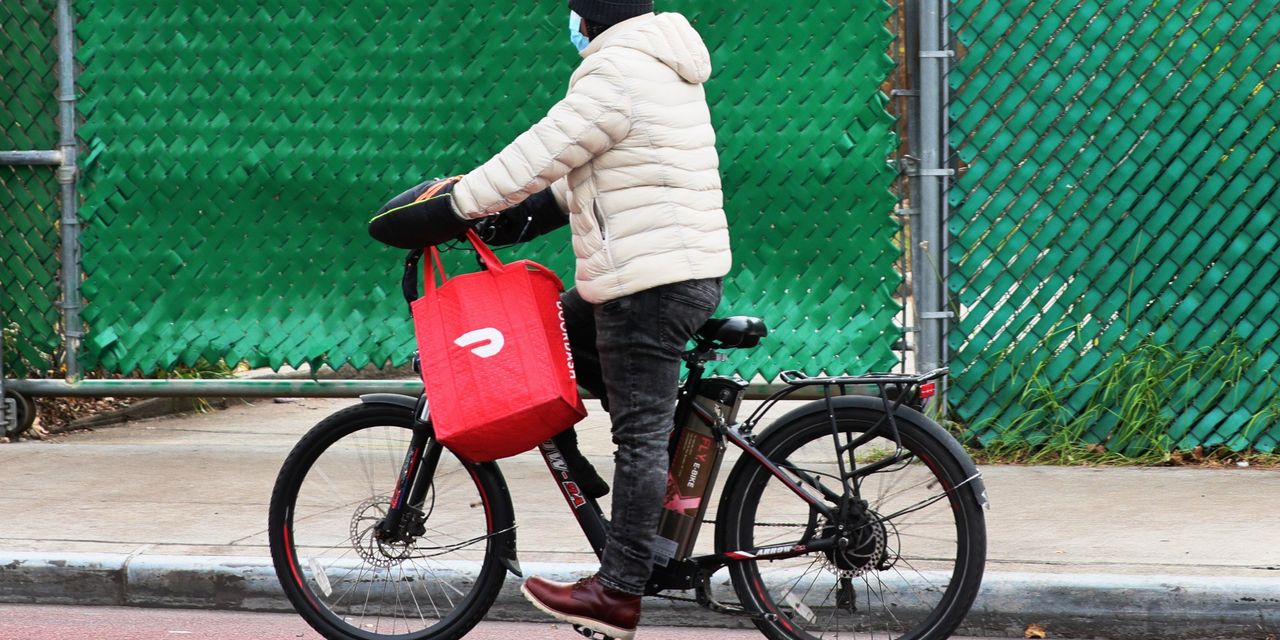Starting next month, tens of thousands of New York City restaurant delivery workers will finally see a new minimum pay rate — a wage floor two years in the making, and the first of its kind in the nation.
Under regulations announced Sunday and published by the city Monday, delivery workers for DoorDash
DASH,
Uber
UBER,
Grubhub and other app platforms will make at least $17.96 an hour without tips by July 12, and at least $19.96 an hour by 2025.
That’s higher than the current $15 minimum wage for other workers in the city, which is set to rise to $16.50 by 2025. Before setting the pay standard, the city had found that delivery workers were making an average of $7.09 an hour without tips.
Some workers and city officials are pleased with the outcome, while other workers are worried and some advocates say it falls short. The companies are speaking out against the new standards, and one hinted at possible legal action.
“This is something huge for us,” Gustavo Ajche, the leader of the workers group Los Deliveristas Unidos, said in an interview with MarketWatch on Monday. Los Deliveristas Unidos has campaigned for the area’s delivery workers for years, and secured a broad set of protections in 2021 — including a minimum wage that was supposed to take effect earlier this year.
Despite the long battle that led to this point, Ajche added, he considers the outcome a win. The new pay standards will “change the economy in the city” because “a lot of workers will have more money to provide for their families,” he said.
New York City Mayor Eric Adams and other officials on Sunday referred to the estimated 61,000 delivery workers in the city as essential workers during the coronavirus pandemic. “Our delivery workers have consistently delivered for us — now, we are delivering for them,” Adams said.
But other city officials, including Comptroller Brad Lander, were critical of the outcome because the minimum-pay figures are less than the $23.82 an hour proposed by the city’s Department of Consumer and Worker Protection (DCWP) late last year, and the pay raise was overdue. That figure would have included a $19.86 base rate, $1.70 to compensate for the absence of workers’ compensation insurance and $2.26 to reflect the delivery workers’ expenses, according to the DCWP.
“City Hall acquiesced to the lobbying of multibillion-dollar app companies, delaying the raises owed to deliveristas six months ago and setting a subminimum wage standard that pads corporate profits off the backs of some of the hardest workers in our city,” Lander said in a statement Monday.
Still, Lander added: “A subminimum pay standard is better than no pay standard at all.”
That lobbying included in-app messages from the companies that warned that worker flexibility would suffer, which pitted workers against workers, said Ajche of Los Deliveristas Unidos. During public comments in December, some delivery workers voiced concerns that a pay standard would result in fewer earning opportunities for them.
Meanwhile, the app-platform companies say the city actually did not listen to them, and that the new rules will result in higher costs that will only serve to hurt workers.
“Today’s deeply misguided decision by the DCWP ignores the unintended consequences it will cause and sadly will undermine the very delivery workers it seeks to support,” Eli Scheinholtz, a DoorDash spokesperson who called the final rule “extreme,” said Monday. “We will continue to explore all paths forward — including litigation — to ensure we continue to best support Dashers.”
Josh Gold, a spokesperson for Uber, said: “The city is lying to delivery workers. They want apps to fund this increase by eliminating jobs and reducing tipping while forcing the remaining workers to deliver orders faster.”
When asked whether the company will reduce some workers’ access to the Uber Eats app as a result of the new rules, Gold said, “We will certainly be following some of the city’s suggestions on how to pay for the rule.” Gold pointed to excerpts from the city’s report on the minimum pay rate, including this one: “The Department anticipates that the greatest adverse impacts from the rule for workers are likely to be the actions apps take to reduce platform access for workers whose time generates relatively little revenue.”
Grubhub took a similar tone to Uber and DoorDash, saying the city chose not to “partner” with the industry. “While we believe New York City had good intentions, we are disappointed in the DCWP’s final rule, which will have serious adverse consequences for delivery workers,” said Liza Dee, a company spokesperson.
Cities and states across the country are adopting a patchwork of rules and laws as app-based companies that consider workers independent contractors are largely avoiding existing labor law and trying to carve out exceptions. Gig workers have been fighting for protections that employees have — including minimum wage, healthcare benefits, paid leave and access to unemployment insurance — with varied success.
The New York City regulations follow a similar ordinance passed in Seattle last year, but the minimum wage for delivery workers in that city will not take effect until early next year.
From the archives (May 2022): Seattle OKs minimum wage for gig workers at delivery companies
From the archives (March 2023): Uber and Lyft drivers in Massachusetts are fighting for the right to unionize
Read the full article here




